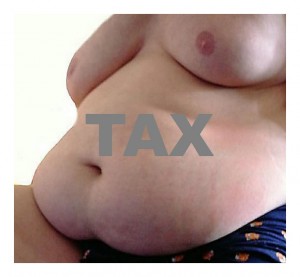Smart People Making Stupid Decisions (Tax, that is!)
 Soda pop is making us fat/obese. Yes! That is the conclusion of an expert panel, selected by the Canadian Heart and Stroke foundation.
Soda pop is making us fat/obese. Yes! That is the conclusion of an expert panel, selected by the Canadian Heart and Stroke foundation.
The experts are also indirectly saying Coke/Pepsi and all other sugared drink is cause of our Heart Attacks and Strokes.
What is the solution the expert panel recommended?
TAX everything that poor can afford to buy, starting with soda pop, fast food, processed food. Their assumption is by shifting the price point of unhealthy food, people will start to eat healthy food.
Why not look it the other way? Bring down the price of healthy food. Lets make it in par with junk food. That was not in the recommendation.
This TAX approach has been tried in many places and has proven to be ineffective.
Imposing a TAX on products does not shift buying behavior. Sometime it encourages to consume more by the buyers to show the vanity they can afford to buy an expensive item.
Example… Price of Gas. Gas is being taxed to the extreme and whenever the city or province needs money, they add a new TAX on gas. Did it discourage driving? Just few weeks ago, a report came out, the Canadian Car Companied are having record breaking sales.
To stop Obesity and create healthy nations with strong heart, we need to target the root underline cause.
People are buying unhealthy food, because that is what they can afford. Price of heart healthy food is out of reach to most people. People buying so called junk food probably does not have a steady source of income or job.
This is how we need to tackle Canada’s obesity problem.
1. Educate people about healthy food and junk food and let them decide without being forced to a decision.
2. Put as many options out there for physical activity as possible
3. Create jobs to put more money in the pockets of poor people
4. Bring down the price of healthy food and drinks (don’t see this point raised by any experts).
Google’s Tangled Weave of Tax Strategy
Fantastic reporting by Bloomberg on Google’s income tax strategy.
New words to learn,
Income Shifting
Transfer Pricing
Double Irish
Dutch Sandwich
Advanced Price Agreement
US corporate income tax rate is 35%. Google’s foreign income tax rate is 2.4%. By shifting earning source from US to Ireland Google’s effective income tax rate is 2.4% on the foreign earnings portion of it revenue.
Is it Legal?
It is absolutely legal. It is approved and heartedly supported by US Congress. Any change to this tax strategy is opposed by US congress. In February, the Obama administration proposed measures to curb shifting profits offshore, part of a package intended to raise $12 billion a year over the coming decade. The Proposals haven’t advanced in Congress at all.
US treasury officials estimate the current policy change in Income Shifting and Transfer Pricing would raise $86.5 billion in new revenue over the next decade. But the policy change was opposed by Congress as they were lobbied by companies, i.e. General Electric Co., Johnson & Johnson, Starbucks Corp., according to federal disclosures compiled by Center for Responsive Politics.
From 2006 to 2009, US treasury lost about $60 billion in tax revenue due to this practice of Income Shifting by leading US companies.
Transfer Pricing Strategy is approved by IRS (Internal Revenue Service). IRS approved Google’s transfer pricing strategy for tax savings in 2006 after three years of negotiation. IRS gave its consent in a secret pact known as advanced pricing agreement. Under the agreement IRS approved the price of licensing of Google’s search and advertising technology and other intangible property for Europe, the Middle East and Africa.
Companies work for shareholders. It is management’s job, to give shareholder’s interest a priority. Larger profit and boosting share price is what shareholders prefer. The no. 1 way to boost earning is income tax strategy to pay less tax. Just by bringing down the effective tax rate from 35% to 2.4% Google boosted its earnings by $3.1 billion. It’s money in the pocket of shareholders. Google’s share price is $607. If Google had paid the $3.1 billion in tax, it share price would have been $100 less.
Simple, but Not so Simple Solution to this Tax Avoidance Strategy:
There is a very simple solution to make companies liable to pay fair share of their tax, like all American do.
Companies report earnings in their quarterly earnings report. All IRS need to do is make sure that the companies pay 35% tax on their pretax earning.
For Example, say Google reported $1.5 billion in pre tax earnings in the quarter. IRS needs to check, how much Google paid taxes on the pre tax earnings. At 35% corporate tax rate, Google should pay $525 million in corporate tax. If they paid any less than $525 million in tax, IRS just need to send them a bill for the difference and enforce the same kind of collection tactic they use on average American people for a tax avoidance and maybe put some of the executives in jail for tax avoidance strategy.
Google is doing nothing illegal. So, the Congress should first decide, if they will stand up to corporations and account them for their due share of income tax. Now that is not simple.
Canada Revenue Agency Income Tax: CRA investment Tax Rate
by admin
leave a comment
Tax Relief for Canadian Small Business
-
Computer cost:
The Government of Canada using Taxpayers money is starting an advertising campaign promoting the 100% capital cost allowance for computers.
“We know it is important for Canadian businesses to remain competitive in today’s changing world,” said The Honourable Keith Ashfield, Minister of National Revenue, “That’s why our Government brought in measures like this one, and many others in Canada’s Economic Action Plan. These temporary measures will help Canadian businesses through this challenging economic time, and make sure they have the tools they need for the future.”
Announced in Canada’s Economic Action Plan, this temporary tax relief measure allows Canadian businesses to claim a 100% capital cost allowance deduction for eligible computer hardware, including systems software, acquired after January 27, 2009, and before midnight, January 31, 2011.
The CCA rate for computer was increased from 55% to 100% with no half year rule in 2009, as a result a full write-off can be claimed in the first tax year that CCA deductions are available.
-
Apprenticeship:
A corporation can earn an input tax credit equal to 10% of the eligible salaries and wages paid to eligible apprentices employed in the business in the tax year and after May 1, 2006, to a maximum credit of $2,000, per year, per apprentice.
An eligible apprentice is one who is working in a prescribed trade in the first two years of their apprenticeship contract. This contract is registered with Canada or a province or territory under an apprenticeship program designed to certify or license individuals in the trade. A prescribed trade will include the trades currently listed as Red Seal Trades.
-
Tax Credit for Child Care Space:
An employer carrying on business in Canada, other than a child care services business, can claim a non-refundable tax credit to create one or more new child care spaces in a new or existing licensed child care facility for the children of their employees and for other children in the community. The non-refundable tax credit is equal to the lesser of $10,000 or 25% of the eligible expenditure incurred after March 18, 2007, per child care space created. Eligible expenditures include the cost of depreciable property (some exclusion apply), and the amount of specified start-up costs, acquired or incurred only to create the new child care space at a licensed child care facility.
-
Small Business Tax Deduction:
For Canadian-controlled private corporations claiming the small business deduction, the net federal tax rate is 11% effective January 1, 2008, down from 12%. The annual amount of active business income eligible for the reduced rate (referred to as the small business limit) was increased from $400,000 to $500,000, effective January 1, 2009.
Corporation Tax Rate Reduction:
The corporation net federal tax rate will decrease as follows:
18% effective January 1, 2010;
16.5% effective January 1, 2011;
15% effective January 1, 2012.
Generally, provinces and territories have two rates for corporate income tax – a lower rate and a higher rate.
Lower rate
The lower rate applies to either:
the income eligible for the federal small business deduction; or
the income based on limits established by the particular province or territory.
Higher rate
The higher rate applies to all other taxable income.
British Columbia corporate tax for lower rate is 2.5% and for higher rate is 10.5% effective January 1, 2010.
Canada Revenue Agency Income Tax: Tax Fraud Tax Payer Tax Rate
by admin
leave a comment
Tax Audit, Here’s How it Works.
An interesting news about income tax audit came to my attention recently.
In Germany, a restaurant operator was flagged for tax audit, because his purchase of supplies did not match with the amount of revenue he was reporting.
The restaurant in a working class neighborhood of Saxony, makes larger than average schnitzels for its customers. Its giant schnitzel servings are very popular with his customers. He serves about 70 dishes a day of this lavish meal.
But according to Tax Auditors, they believe the restaurant sells 200 servings daily, based on the amount of
more »
Canada Revenue Agency Income Tax Property Tax Real Estate: Income Tax Property Tax Real Estate Tax Tax Rate
by admin
leave a comment
Tax on Income from Real Estate Sale
With the current market conditions of real estate in Vancouver and so many people buying property for their first home or investment property, it would be wise to take into consideration the tax implication, when you sell the property. Net Income from sale of property can be taxed as a business income or a capital gain, depending on the usage of the property and the primary intention of the owner.
more »
